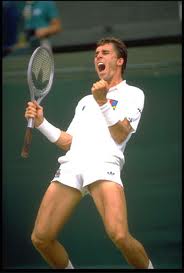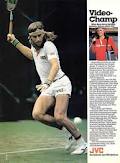Think professional - it's hard, but fun!
We are all allowed our dreams. In other articles on this site I show how some children become fascinated with the professional game of tennis, and sometimes go to great extremes to copy every shape and move that a tennis star produces.
Even if you become a clone of Bjorn Borg, an exact copy, you probably won't achieve your goal of becoming a professional. Unfortunately there are too many variables on that long journey, and unsurmountable hurdles get in the way of the greatest talents. I have played so many matches, watched so many games, and seen so many players where I've thought - he, or she, could have been a pro. Easily. All the qualities are there. Why didn't it happen?

Are you copying your favourite player?
I have to confess that my boyhood dream was not to become a professional tennis player. Although I came from a semi-professional tennis family, and had every access to clubs and coaches, it wasn't tennis I wanted to do. Through the media in UK, the professional game projected no image of career prospects, how to do it, and what sort of life you'd have. On British TV the game was almost non-existant, and elsewhere the game was under-mediatised. In fact tennis in general had a reputation as a game for the upper classes, a social game followed by sandwiches, cakes and tea.
The modern child in UK, but particularly in Europe, can see the professional game all around him. Facilites are everywhere, and professional coaches work on the courts all year round. The ATP, the WTA, the ITF and National Federations bring tournaments and professional players to your door. It is very difficult NOT to be inspired by them.
Do you have tennis culture?
However, the big change in recent years has been the media, and in particular, cable, satellite, and internet television. You can watch your favourite player play all of his matches all year round. You don't even need to get out of your armchair. You can analyse his game, slow motion it, copy it, and integrate it into your game. Modern children have the perfect tools for becoming professional in their dreams, and getting themselves ready for that day when they decide they are going to commit themselves to the big professional project.

Junior tournament tour
When I first went to Germany I was first exposed to a lot of tennis on TV. It was a revelation to me, almost as much a revelation as the completely different attitude of Germans towards tennis compared to the British. I studied games, players, surfaces live and on video, and tried to work out how to do it. I wanted then to become a professional. Although I was already a teaching professional, I wasn't a playing professional, and I wanted to be a player more than anything. I didn't have access to help. I didn't know how to plan and organise, so I had to make up my own lifestyle in order to get as close as possible to achieving my dream.
There were some professional players who interested me more than others. I'll give you an insight as to why they did. Then I'll look at the modern game and you can compare the role models that I had, and the ones that you know today.

Beginning a professional career
There are circumstantial differences. I'd claim that Borg, superb an athlete as he was, would have struggled in the modern game. Borg was discovered as a junior, protected from the hurly-burly of the lower ranks of the professional game by his coach and manager, and came into his chosen career almost as an outsider. Protecting a player from the nasty pitfalls on the long ladder is a fine idea, but very few achieve this, or even strive to do this, today. If you want to be a professional, 99 % of players have to learn the hard way, ranking point by ranking point.
Borg famously disappeared from the professional game when his bubble in the professional world seemed to him to have burst. He was too young to stop, but stop he did. Abruptly and violently, and consequently his reintegration into normal life was not easy. I would argue that it is better to have all the bumps going up the ladder, then you will recognise those bumps on the way down and handle them well. An objective of any coaching advice must be to create well-rounded individuals, despite the special journey that they will be going on.
Professional pressure
Think professional - it's hard, but fun!
Professional tennis is the career for you!
Perfect player
Have A Great Story About This Topic?
Do you have a great story about this? Share it!
